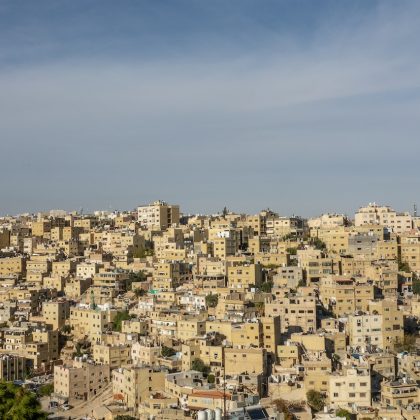A ‘Significant’ and ‘Concrete’ Step Forward? UN Releases Database of Businesses Linked to Israeli Settlements in the OPT (1/2) Reactions to and Scope of the Report
On 12 February 2020, the United Nations High Commissioner for Human Rights (Commissioner) issued a report on all business enterprises involved in certain activities relating to Israeli settlements in the Occupied Palestinian Territory (OPT) (Report). The Report contains a database of 112 businesses that the Commissioner has reasonable grounds to conclude have been involved in certain activities in Israeli settlements in the West Bank. Of the businesses listed, 94 are domiciled in Israel and the remaining 18 in 6 other countries: France, Luxembourg, the Netherlands, Thailand, the UK and the US. Many of the latter are household names in digital tourism, such as Airbnb, Booking, Expedia, Opodo and TripAdvisor, as well as Motorola.
This post explores the diverse reactions to, and the legal basis for, the Report. The possible effects of the Report, and its significance in the broader context of business and human rights, are explored in a second blog post.
Swift and Mixed Reactions
The drafting and publication of the Report has been much delayed and hugely controversial. The UN has repeatedly been criticised for its “disproportionate focus and unending hostility” as well as political bias towards Israel. In the press release accompanying the publication of the Report, the current Commissioner, Michelle Bachelet, acknowledged its controversial nature: “I am conscious this issue has been, and will continue to be, highly contentious”.
Unsurprisingly, reactions to the Report have been swift and mixed. Within hours of its publication, Israel’s Ministry of Foreign Affairs denounced the Report as a “blacklist” of companies and, as a self-described “exceptional and harsh measure” in retaliation for its publication, suspended its ties with the United Nations Human Rights Council (Council). By contrast, the Palestinian Foreign Minister praised the Report as a “victory for international law”, and the Prime Minister entreated companies in the database to immediately cease their operations in the Israeli settlements, stating that his government would “pursue the companies listed in the report legally through international legal institutions and through the courts in their countries for their role in violating human rights”.[1]
NGOs focused on responsible business conduct have welcomed the Report as an important step to holding listed businesses accountable. Al-Haq, an NGO based in the West Bank, commented on Wafa, the Palestinian newsagency, that the database was “integral to ending corporate complicity in human rights violations” and emphasised the importance of the database being updated annually to incentivise and deter companies from engaging with the Israeli settlements.[2] Human Rights Watch commented that the database “should put all companies on notice: to do business with illegal settlements is to aid in the commission of war crimes.”
Scope and Purpose of the Report
The Council mandated the production of the Report in Resolution 31/36, adopted in March 2016. Paragraph 17 of the Resolution required the Commissioner, in “close consultation” with the UN Working Group on Business and Human Rights, to produce a database of all business enterprises involved in activities contained in paragraph 96 of the Fact-Finding Mission Report. The drafting of the list involved interpreting and applying three cumulative elements: (a) “business enterprises”; (b) “involved”; (c) in one or more “listed activities”.
(a) “Business Enterprises”
The Commissioner construed “business enterprises” to mean “all relevant entities” of concern, “including parent companies and their subsidiaries, franchisors and franchisees, local distributors of international companies, partners and other entities in relevant business relationships.” The nature and substance of the functions and activities of the businesses’ entities, irrespective of the corporate structure or characterisation of the business under national law, was taken into account for the purpose of the Report. This broad construction of “business enterprises” reflects the equally broad meaning of “business relationships” in the United Nations Guiding Principles (UNGPs), namely “relationships with business partners, entities in its value chain, and any other non-state or state entity directly linked to its business operations, products or services.”
(b) “Involved”
Similarly, the Commissioner construed “involved” very broadly to include “substantial and material business activity that had a clear and direct link to one or more of the listed activities”, namely a business enterprise itself engaged, or a parent company owning a majority share of a subsidiary engaged, or a business enterprise granting a relevant franchise or license to a franchisee or licensee engaged, in a listed company in the OPT. This construction mirrors the UNGPs which provide that the responsibility of businesses to respect human rights requires that they seek to prevent or mitigate adverse human rights impacts that are directly linked to their operations, products or services by business relationships, even if they have not contributed to those impacts.
Only activities between the period 1 January 2018 to 1 August 2019 fell within the Report’s scope.
(c) “Listed activities”
In contrast to the broad understanding of the first two cumulative elements, the Commissioner construed the meaning of “listed activities” narrowly. The database only captures the activities listed in paragraph 96 of the Fact-Finding Mission Report, set out below:
Information gathered by the mission showed that business enterprises have, directly and indirectly, enabled, facilitated and profited from the construction and growth of the settlements. … [T]he mission identified a number of business activities and related issues that raise particular human rights violations concerns. They include:
(a) The supply of equipment and materials facilitating the construction and the expansion of settlements and the wall, and associated infrastructures
(b) The supply of surveillance and identification equipment for settlements, the wall and checkpoints directly linked with settlements
(c) The supply of equipment for the demolition of housing and property, the destruction of agricultural farms, greenhouses, olives groves and crops
(d) The supply of security services, equipment and materials to enterprises operating in settlements
(e) The provision of services and utilities supporting the maintenance and existence of settlements, including transport
(f) Banking and financial operations helping to develop, expand or maintain settlements and their activities, including loans for housing and the development of businesses
(g) The use of natural resources, in particular water and land, for business purposes
(h) Pollution, and the dumping of waste in or its transfer to Palestinian villages
(i) Captivity of the Palestinian financial and economic markets, as well as practices that disadvantage Palestinian enterprises, including through restrictions on movement, administrative and legal constraints
(j) Use of benefits and reinvestments of enterprises owned totally or partially by settlers for developing, expanding and maintaining the settlements
The scope of the activities that may cause a business enterprise to be listed on the database is therefore restricted. The database does not cover all business activity in the settlements, nor business activity in the OPT that may raise human rights concerns. Indeed, several high-profile companies known to be operating in the Israeli settlements by key NGOs have not been named.
The restricted scope of the database assists to identify the purpose of the Report, namely:
Private companies must assess the human rights impact of their activities and take all necessary steps – including by terminating their business interests in the settlements – to ensure that they do not have an adverse impact on the human rights of the Palestinian people, in conformity with international law as well as the Guiding Principles on Business and Human Rights. The mission calls upon all Member States to take appropriate measures to ensure that business enterprises domiciled in their territory and/or under their jurisdiction, including those owned or controlled by them, that conduct activities in or related to the settlements respect human rights throughout their operations.[3]
At the heart of the Report are the UNGPs, including the binding obligation on states to protect human rights, and the corporate responsibility to respect human rights in business operations. In the absence of the Israeli government’s compliance with its obligation to protect the human rights of Palestinians in relation to the unlawful Israeli settlements in the OPT, and the inability of the UN to enforce such compliance, the focus of the Council has instead shifted to what other Member States and businesses can do to remediate the harm caused by these settlements. Such states can implement legislation in accordance with the UNGPs, requiring companies to conduct human rights due diligence regarding their operations, thereby effectively ensuring legal accountability for companies that operate in and assist the Israeli settlements. As stated by the Commissioner in the preliminary report on the database published in February 2018:
… considering the weight of the international legal consensus concerning the illegal nature of the settlements themselves, and the systemic and pervasive nature of the negative human rights impact caused by them, it is difficult to imagine a scenario in which a company could engage in listed activities in a way that is consistent with the Guiding Principles and international law.
Businesses have been warned.
Read the second blog post for a discussion of the potential effects of the Report for listed businesses. This subsequent blog will also reflect on the importance of the Report in the broader context of responsible business conduct and holding businesses to account for their complicity in human rights violations.
Editor’s note: The topic of business responsibility within the Israeli settlements in the Occupied Palestinian Territory has been further explored in the Business and Human Rights Journal by Valentina Azarova (DOI: https://doi.org/10.1017/bhj.2018.14) and Marya Farah and Maha Abdallah in relation to security firms (DOI: https://doi.org/10.1017/bhj.2018.27).
Katharine Booth is currently working with the Asser Institute in The Hague. She holds a LLM, Advanced Programme in European and International Human Rights Law from Leiden University, Netherlands and a LLB and BA from the University of New South Wales, Australia. She previously worked for a Supreme Court Justice and as lawyer in Australia. Katharine would like to thank Antoine Duval for his comments on her draft blog post, a version of which was originally published on the Doing Business Right blog.
[1] ‘Calling to shut down offices in settlements, premier says companies will be pursued legally’ (WAFA, 12 February 2020)
[2] ‘Al-Haq: list of firms integral to ending corporate complicity in human rights violations’ (WAFA, 13 February 2020)
[3] Fact-Finding Mission Report, Paragraph 117






